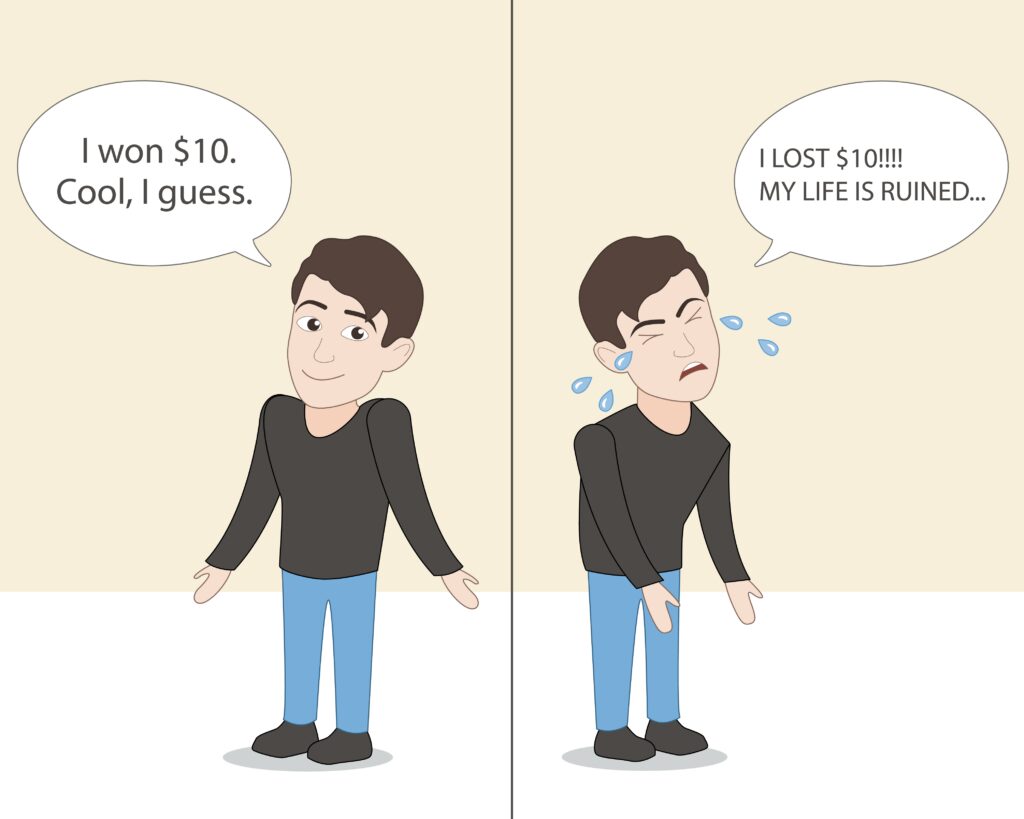Loss aversion is a psychological principle that has profound implications for decision-making in online casinos. This concept, rooted in behavioral economics, suggests that people feel the pain of losing more intensely than the pleasure of gaining. In the context of online gambling, loss aversion significantly shapes how players interact with games, make bets, and manage their emotions. Below, we’ll explore five ways loss aversion impacts online gambling behavior, with a focus on how this phenomenon influences decisions and strategies.

Chasing Losses to Avoid Emotional Discomfort
One of the most common manifestations of loss aversion in online casinos is the tendency to chase losses. Players who lose a bet often feel compelled to recover their losses quickly, leading to risky behaviors. This urge stems from the emotional discomfort associated with losing, which outweighs the potential satisfaction of winning.

Example in Online Casinos
In games like online slots or roulette, a player might increase their wager after a losing streak, hoping for a big win to break even. This behavior can lead to a vicious cycle, as losses accumulate faster than anticipated.
Tip for Players:
To counteract this tendency, set a strict budget before playing and stick to it. Recognize that chasing losses often results in deeper financial setbacks.
Preference for Smaller, Guaranteed Wins Over Bigger Risks
Loss aversion also influences players to prefer smaller, guaranteed payouts over larger, riskier ones. This can be observed in game choices where players opt for low-volatility slots or avoid high-stakes table games.
Example in Online Casinos
In poker or blackjack, players may fold too early to avoid the risk of losing a hand, even when they have a reasonable chance of winning. Similarly, they may cash out small winnings prematurely in progressive slots, foregoing the opportunity for a jackpot.
Tip for Players:
Understand the odds and game mechanics to make informed decisions. Balancing risk and reward can help maximize enjoyment and potential winnings.
Avoiding High-Risk Games Despite Potential Rewards
Loss aversion can make players overly cautious, causing them to avoid games perceived as high-risk. While this behavior minimizes losses, it also limits the chances of substantial rewards.
Example in Online Casinos
Games like baccarat or craps, which may appear intimidating due to their complexity or high betting requirements, often see fewer players. However, these games can offer better odds than some low-risk alternatives.
Tip for Players:
Take the time to learn about high-risk games. Many online casinos offer demo modes to practice without financial commitment. Understanding the rules can reduce fear and encourage more calculated risks.
Sticking to Familiar Games to Minimize Loss Perception
Loss aversion often leads players to stick with games they’re familiar with, even when the odds aren’t in their favor. This behavior is driven by the fear of losing money on unfamiliar games.

Example in Online Casinos
A player might repeatedly choose online slots they’ve played before, avoiding table games like poker or blackjack that require strategy. This preference can prevent them from exploring games with potentially better returns.
Tip for Players:
Expand your gaming portfolio by experimenting with new games in free or low-stakes modes. Gaining confidence in different games can diversify your experience and potentially improve your outcomes.
Impact of Loss-Framing in Promotions and Offers
Online casinos often leverage loss aversion in their marketing strategies. Promotions like cashback offers or bonus rounds are framed to reduce the sting of losses, encouraging players to continue gambling.
Example in Online Casinos
A promotion might advertise, “Get 50% cashback on your losses!” While this offer appears to cushion the impact of losing, it also motivates players to keep wagering, believing their losses are mitigated.
Tip for Players:
While promotions can be advantageous, always read the terms and conditions. Understand the wagering requirements and limits before committing to any bonus.
Final Thoughts
Loss aversion is a powerful psychological force that shapes online gambling behavior in subtle yet significant ways. Whether it’s chasing losses, avoiding high-risk games, or sticking to familiar options, understanding how this principle influences decision-making can help players navigate online casinos more effectively.
By recognizing the impact of loss aversion and employing strategies to mitigate its effects, players can strike a balance between entertainment and responsible gambling. Remember, the goal of online gambling should always be enjoyment, not just financial gain. Stay informed, set limits, and play wisely to make the most of your gaming experience.
